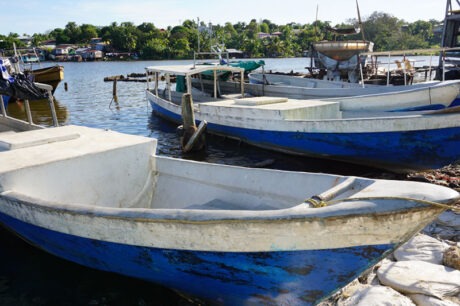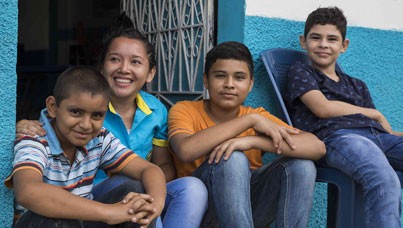“Why do we care about 15-17-year-olds?”
The Global Youth Economic Opportunities Summit hinged on this question, posed by keynote speaker Cassie Crockett, Director and Head of Strategy for Schmidt Futures, in its fourth virtual session of 2020.
Crockett explained that with youth-centered programs, “you are meeting them at an inflection point, you are capturing them at this moment when they are considering what their trajectory into adulthood will look like.”
Convening organizations dedicated to developing methods to build the skills that young people need to achieve long-term social and economic success, GYEOS offered a breakout session featuring representatives from USAID’s Community, Family and Youth Resilience (CFYR) program in the Caribbean.
During an Oct. 8 session titled, “Family Systems to Improve Psychosocial and Life-Skills Among At-Risk Youth: An Evidence-Based Approach,” panelists explored how CFYR’s family-based therapy model, delivered through the Family Matters intervention, improves outcomes for ‘at risk’ youth.
“We recognize that majority of solutions are going to come through the family,” said Dr. Andre Brown of Heru Consulting, who has been training CFYR’s family counselors since 2018.
In the Caribbean, youth face high levels of unemployment and crime, as well as a lack of psycho-social support services. Using a risk assessment tool called the Youth Services Eligibility Tool (YSET), young men and women who are considered at secondary level of risk for engaging in delinquent behavior enter Family Matters. The program then pairs highly trained counselors with youth and their families to build tools to navigate conflict, improve communication and ultimately build resiliency in vulnerable communities.
“My family counselor helped me realize my strengths and transition from a high school student to the world of work … look at me now, a young entrepreneur who focuses on photography and has his own clothing line,” explained Evron, a young Family Matters graduate, in a video he prepared for the event.
Since 2016, USAID’s CFYR has been counseling youth like Evron and implementing evidence-based, targeted interventions in 15 high-risk communities across Saint Lucia, Guyana, and St. Kitts and Nevis, as part of a place based, public health approach to youth violence prevention.
The soft skills developed by family counselors during coaching sessions with youth, such as self-efficacy, emotional self-regulation, and goal orientation, translate to job readiness and retention, which was a major focus at the GYEOS session.
Speaking on the panel, Government of St. Kitts and Nevis representative and CFYR partner, Michèle de la Coudray Blake, explained how the effects of this work ripple far beyond the home.
“Regulation of self, of mood, ability to manage anger and conflict… if the youth is able to manage himself in a way that is effective, he can achieve success in other areas of life whether it is school or work,” said Blake. “The more the youth is able to manage self and build confidence and resilience, those will translate to school and work success.”
Citizen Security Project Director, Dr. Erik Alda, explored trends across all four family-based therapy programs implemented by Creative over the past six years, where on average, 75 percent of youth beneficiaries were found to be less likely to engage in crime and violence.
This trend was reflected in the Caribbean, where 73 percent of youth participants experienced a reduction in risk factors – 56 percent experienced such a dramatic decrease that they were no longer considered to be at risk after twelve months of counseling.
“[Counseling] is hugely important for these kids,” said Dr. Alda. “The skills [developed] are sustained.”
For the counselors, said Blake, the quantitative findings support the positive changes they are seeing. They embrace a holistic approach, working with participating youth, their families, and the wider community to set the stage for a sustainable transformation.
“Seeing the numbers was empowering to us, seeing the reduction in risk factors,” said Blake. “It is important to tie what the data says to the family stories. [Families say] ‘he’s listening’ or ‘we are getting on.’ The language they use to describe the cohesion of the family and aligns with what the data says.”
At the heart of the methodology lies a deep commitment to families – they are key allies in the effort to build more resilient communities. Through healing relationships, helping youth establish and pursue career goals, and educating the family on the services available to them, counselors set the stage for a sustainable transformation In this way, positive changes made at the family level are expected to have a wider impact on breaking endemic cycles of violence.
“We are partners in the process,” said Dr. Brown.



